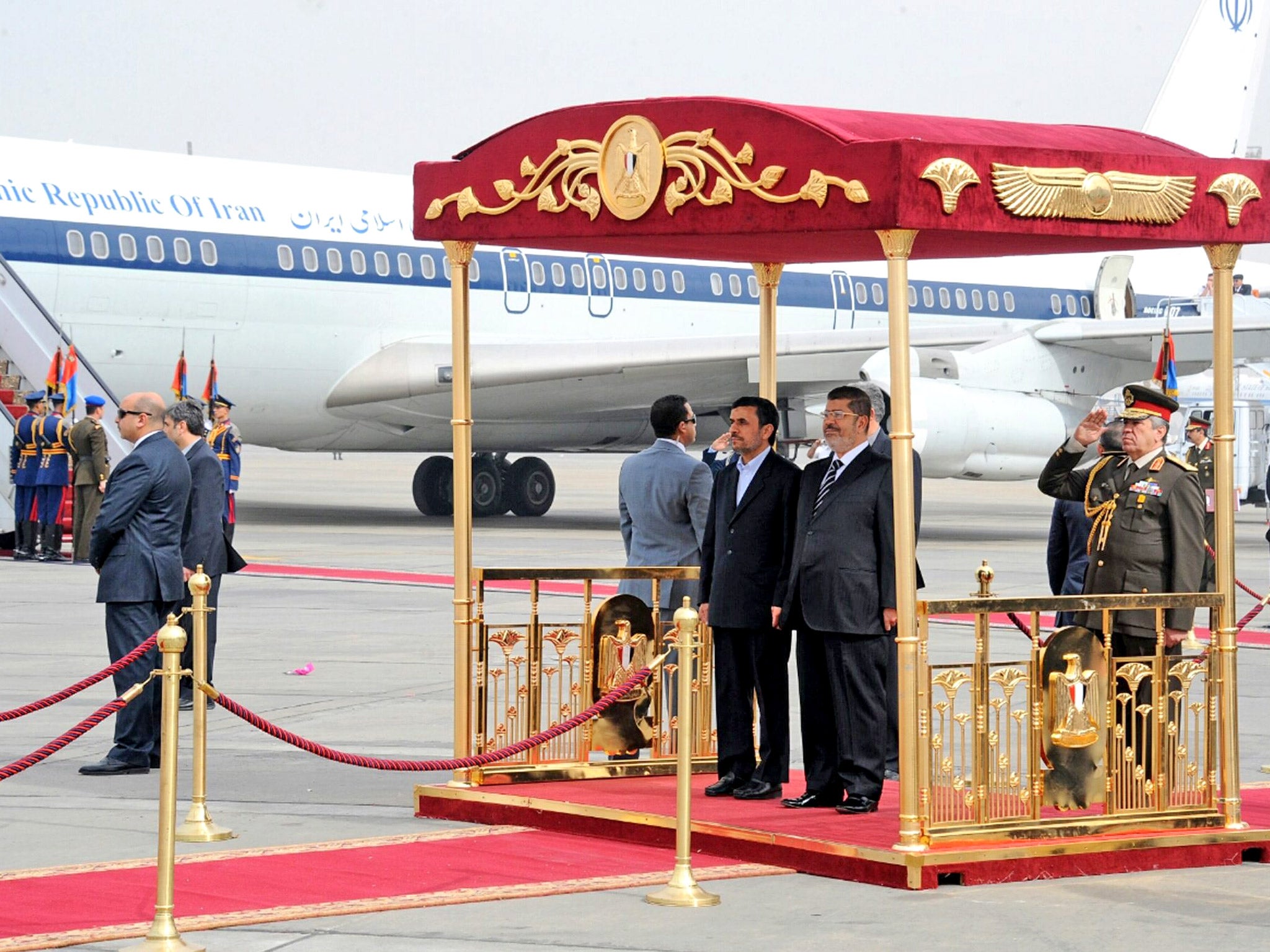Mahmoud Ahmadinejad flies into trouble in Egypt as ally is arrested in Tehran
Turmoil at home as Iranian leader makes first visit to Cairo since Tehran's 1979 revolution

Your support helps us to tell the story
From reproductive rights to climate change to Big Tech, The Independent is on the ground when the story is developing. Whether it's investigating the financials of Elon Musk's pro-Trump PAC or producing our latest documentary, 'The A Word', which shines a light on the American women fighting for reproductive rights, we know how important it is to parse out the facts from the messaging.
At such a critical moment in US history, we need reporters on the ground. Your donation allows us to keep sending journalists to speak to both sides of the story.
The Independent is trusted by Americans across the entire political spectrum. And unlike many other quality news outlets, we choose not to lock Americans out of our reporting and analysis with paywalls. We believe quality journalism should be available to everyone, paid for by those who can afford it.
Your support makes all the difference.The Iranian President Mahmoud Ahmadinejad has arrived in Egypt on a landmark visit, leaving behind open political warfare in Iran that has resulted in the arrest of Tehran’s former chief prosecutor.
Mr Ahmadinejad was welcomed by the Egyptian President, Mohamed Morsi, during the first visit to Egypt by an Iranian leader since Tehran's 1979 revolution. But officials played down expectations of an imminent restoration of diplomatic ties between the Shia and Sunni nations. The two leaders' 20-minute conversation focused on the Syrian civil war, in which they back opposing sides.
Visiting Cairo to attend an Islamic summit that begins on Wednesday, Mr Ahmadinejad told a news conference he hoped his trip would be "a new starting point in relations between us". But the most prominent cleric in Egypt, Sheikh Ahmed el-Tayeb at al-Azhar University, said after meeting Mr Ahmadinejad that Iran should not assist attempts to topple the Sunni royal family in Bahrain.
Tonight, a man was being held after he attempted to throw a shoe at Mr Ahmadinejad outside the Al-Hussein mosque in Cairo. Turkey's Anatolia news agency published a video of the incident which showed the young man shouting and attempting to hit the President's head with what appeared to be a brown loafer.
Mr Ahmadinejad's visit removes him briefly from the turmoil of Iranian politics, which erupted on Sunday after the President accused one of his conservative rivals of corruption. Mr Ahmadinejad told parliament that he had a video of the speaker Ali Larijani's brother attempting to bribe the former prosecutor Saeed Mortazavi over a business deal involving the speaker. But when challenged to play it, the sound was of such poor quality that Mr Ahmadinejad was forced to provide a running commentary, depriving the tape of much of its impact.
Mr Mortazavi, an Ahmadinejad ally, was arrested on Monday night. "[Iran's] political elite is now embroiled in open infighting," said Ali Ansari, a professor of Iranian history at St Andrews University. "The big question now is whether Khamenei is losing control," he said, referring to Iran's spiritual leader, Ayatollah Ali Khamenei.
Ali Larijani, who ran for president in 2005, and Mr Ahmadinejad have long been rivals. It was not clear whether the former prosecutor – who was suspended from that post over the deaths of three anti-government protesters in 2009 – had been arrested in connection with the 2009 deaths or on corruption charges. But Mr Ansari said that Mr Ahmadinejad "will go down fighting. And he could take a lot of people with him." Although the President is barred from running for a third term in elections next June, political manoeuvring is already under way and Mr Larijani is expected to be a candidate. It is not yet clear, however, who will be supported by the spiritual leader.
According to Mr Ansari, "people are looking for a scapegoat. But it's not clear that Ahmadinejad is the only one."
Reserve funds fall to $13.6bn
Egypt’s foreign currency reserves fell 10 per cent to $13.61bn (£8.5bn) in January, down $1.4bn in a single month.
The central bank had already warned late last year that levels hovering around $15bn represented a “critical minimum,” or just enough to cover three months’ worth of imports. The drop hampers Egypt’s ability to implement the austerity measures it needs to qualify for a $4.8bn IMF loan.
The central bank has been using foreign reserves to prop up the Egyptian pound at a level many experts saw as overvalued. AP
Join our commenting forum
Join thought-provoking conversations, follow other Independent readers and see their replies
Comments